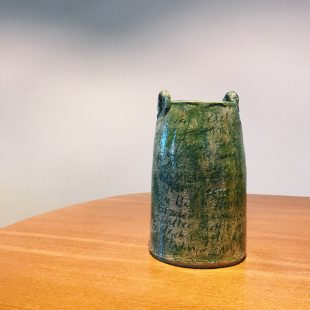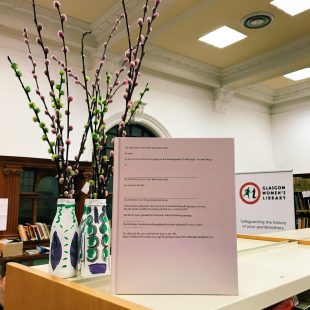On the close of ‘Our Red Aunt’ an exhibition by Fiona Jack at GWL inspired by the legacy of Helen Crawfurd, we hear from Laura Matheson who introduces us to some of Helen Crawfurd’s literary inspirations.
Those who have taken a look at Helen Crawfurd’s autobiography, which occupied a library shelf as part of the Our Red Aunt exhibition, will have immediately noticed her proud dedication to both reading and writing. Helen alludes to authors in almost every chapter, along with articulate descriptions of her influences and inspirations. Indeed, it is her own writing that catalysed the exhibition, and which carried her unique voice forward through a history which had often neglected her. In this alone, ‘the value of the written word’ which Helen strongly believed in is evident. The parallel interests of this avid reader and the work of Glasgow Women’s Library is one of many illuminating connections drawn into focus by Fiona Jack’s exhibition. In celebration of this, Fiona, in collaboration with Fiona Dean, produced ‘A love of books’, one of several ceramics on display. What better way to understand Helen’s remarkable life and commitment to gender equality than through the texts which compelled her to take action?

This vibrant green glazed stoneware bottle collects each author referenced in the text in simple handwriting, overlaid with a wash of colour which symbolises the fusing together of these foundations of Helen’s world view and politics. Look carefully and you’ll see Maxim Gorky, Thomas Hardy, and Karl Marx, among many others.
Throughout her autobiography Helen describes how her political education was refined through a process of ‘learning and unlearning’. As she began to enter public debates and answered questions during her lectures, she was exposed to a multitude of opinions and a diversity of backgrounds which made her question her worldview shaped by her relatively wealthy upbringing (she notes that the ‘unlearning was not easy’). She turned to political texts and historical research to gain a clearer picture of the world, noting particularly the influence of pioneering women such as Charlotte Perkins Gilman, whose Woman and Economics Poem she quotes in Chapter 31, Olive Schreiner, South African anti-war campaigner and author of Women and Labour, and Josephine Butler, whose opposition to the ‘Contagious Diseases Act’ was much admired by Helen.
Her reading was not confined to non-fiction however; she saw clearly the power of fiction to capture the imagination in a way hard facts could not. She had a particular fondness for novels, which appears to stem from her childhood subscription to the London Story Paper, and being read the stories of Robert Louis Stevenson. There was an obvious thirst for knowledge in her interest in remote lands, history and maps, showing an acute awareness of a ‘bigger picture’ from an early age. This was not diminished.
During her first marriage Helen read novels in ‘open defiance’ of her disapproving husband, local minister Alexander Montgomerie Crawfurd (she would later notice his bookmark appearing in the books, however!). She found Sir Walter Scott illuminating in his depiction of Scotland’s changing economic conditions, while Victor Hugo ‘made a deep impression’ on her. H.G. Wells, author of The War of the Worlds, was then a prominent social critic, whose writings about industrial conditions in both the UK and the US were helpful to Helen. In particular, Charles Dickens’ novels such as Hard Times and Great Expectations, were critical to Helen for ‘exposing the injustices and wrongs of his day’ which she saw echoed in her own age. Elizabeth Gaskell offered similar insight in her novel Mary Barton, which Helen references in Chapter 32. The writings of Tolstoy and Dostoyevsky allowed her to contextualise the Russian Revolution before she visited in 1920, while her understanding of Germany was enhanced by reading the philosophy of Hegel, Kant and Feuerbach.
Her literary interests were varied, and she writes fondly too of seeing plays performed in the Glasgow Repertory Theatre at a time when her interest in women’s position in society was only budding. Henrik Ibsen’s Ghosts and A Doll’s House critiqued the ‘hypocrisy and ignorance surrounding the whole question of sex’, while plays by Israel Zangwill and John Galsworthy were similarly scandalous. She was equally inspired by poetry, making note of Elizabeth Barrett Browning, Walt Whitman and Alfred Tennyson. Special attention should be paid to her reverence of Robert Burns, Scotland’s national poet. In Chapter 31 she asserts that ‘Burns hated oppression and loved liberty’, while noting that he ‘stood’ with the working class, as Helen strived to do throughout her life. Quotes from his poetry are used throughout to emphasise her own beliefs, using poetic form where prose was insufficiently emotive. Memorably, she writes of her anger when Burns’ Cottage was nearly blown up by two militant suffragettes (a local newspaper recorded this ‘dastardly attempt’ as being in 1914). In spite of her support for the suffragette movement, Helen echoed the widespread horror in a public address that evening. Nonetheless, her belief in his radical convictions remained strong, and she concluded that ‘had Burns felt that the burning of his birthplace would give political freedom to the women of his country, he would have gladly sacrificed it.’ She herself was no stranger to sacrifice in the name of a greater cause.

Reading Helen’s own contribution to the GWL shelves, her passion for literature is inspiring. Born in 1877, her access to texts by diverse writers, across gender, race and class, was far more limited than today. Before her commitment to women’s rights, and later communism, enabled her to travel Europe and debate with the great politicians and theorists of her day, she had access to a world of history and lived experience through the books and papers she studied eagerly. As an intern at Glasgow Women’s Library today, I can’t help but think Helen would approve of our community of readers, borrowers and donators; all furthering her celebration of the power of the written word and the voice and platform it offers women.

4 replies on “A Literary Guide to Helen Crawfurd”
Excellent article, thank you for bringing this piece of history to our attention.
Very interesting and well written article about this lady
The power of literature in shaping the thoughts, political viewpoint and subsequent actions of Helen Crawfurd is clearly delineated in this article. She was self taught and that is a concept which is no longer in fashion. Too bad.
“Never let school interfere with your education” Mark Twain
I have just discovered this remarkable woman, and am looking forward to finding out more by reading her words and the knowledgable essays etc to put them in context, from this great resource and others. I came across her when researching the genealogy and history of the family of her step daughter Anne Rankin Crawfurd’s husband, Andrew Laughland. The extended family among these Laughland step-relations included many capitalists and professionals among the men, and later some women studying medicine from the 1930s onwards. I wonder how they all variously handled these big issues and changes in society. Not as influentially as Helen Crawfurd, and not leaving a similar legacy, but I hope to learn and extrapolate from her words.